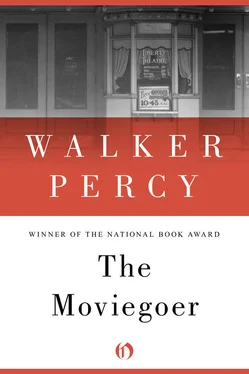Walker Percy - The Moviegoer
Здесь есть возможность читать онлайн «Walker Percy - The Moviegoer» весь текст электронной книги совершенно бесплатно (целиком полную версию без сокращений). В некоторых случаях можно слушать аудио, скачать через торрент в формате fb2 и присутствует краткое содержание. Год выпуска: 2011, Издательство: Open Road Media, Жанр: Современная проза, на английском языке. Описание произведения, (предисловие) а так же отзывы посетителей доступны на портале библиотеки ЛибКат.
- Название:The Moviegoer
- Автор:
- Издательство:Open Road Media
- Жанр:
- Год:2011
- ISBN:нет данных
- Рейтинг книги:5 / 5. Голосов: 1
-
Избранное:Добавить в избранное
- Отзывы:
-
Ваша оценка:
- 100
- 1
- 2
- 3
- 4
- 5
The Moviegoer: краткое содержание, описание и аннотация
Предлагаем к чтению аннотацию, описание, краткое содержание или предисловие (зависит от того, что написал сам автор книги «The Moviegoer»). Если вы не нашли необходимую информацию о книге — напишите в комментариях, мы постараемся отыскать её.
The Moviegoer — читать онлайн бесплатно полную книгу (весь текст) целиком
Ниже представлен текст книги, разбитый по страницам. Система сохранения места последней прочитанной страницы, позволяет с удобством читать онлайн бесплатно книгу «The Moviegoer», без необходимости каждый раз заново искать на чём Вы остановились. Поставьте закладку, и сможете в любой момент перейти на страницу, на которой закончили чтение.
Интервал:
Закладка:
He is a senior at a small college in northern Wisconsin where his father is bursar. His family is extremely proud of the educational progress of their children. Three sisters have assorted PhDs and MAs, piling up degrees on into the middle of life (he speaks in a rapid rehearsed way, a way he deems appropriate for our rare encounter, and when he is forced to use an ordinary word like “bus”—having no other way of conferring upon it a vintage flavor, he says it in quotes and with a wry expression). Upon completion of his second trimester and having enough credits to graduate, he has lit out for New Orleans to load bananas for a while and perhaps join the merchant marine. Smiling tensely, he strains forward and strikes himself dumb. For a while, he says. He means that he hopes to find himself a girl, the rarest of rare pieces, and live the life of Rudolfo on the balcony, sitting around on the floor and experiencing soul-communions. I have my doubts. In the first place, he will defeat himself, jump ten miles ahead of himself, scare the wits out of some girl with his great choking silences, want her so desperately that by his own peculiar logic he can’t have her; or having her, jump another ten miles beyond both of them and end by fleeing to the islands where, propped at the rail of his ship in some rancid port, he will ponder his own loneliness.
In fact, there is nothing more to say to him. The best one can do is deflate the pressure a bit, the terrible romantic pressure, and leave him alone. He is a moviegoer, though of course he does not go to movies.
The salesman has no such trouble. Like many businessmen, he is a better metaphysician than the romantic. For example, he gives me a sample of his product, a simple ell of tempered and blued steel honed to a two-edged blade. Balancing it in his hand, he tests its heft and temper. The hand knows the blade, practices its own metaphysic of the goodness of the steel.
“Thank you very much,” I say, accepting the warm blade.
“You know all in the world you have to do?”
“No.”
“Walk into the office—” (He sells this attachment to farm implement stores) “—and ask the man how much is his bush hog blade. He’ll tell you about nine and a half a pair. Then all you do is drop this on his desk and say thirty five cents and you can’t break it.”
“What does it do?”
“Anything. Clears, mulches, peas, beans, saplings so big, anything. That little sombitch will go now.” He strikes one hand straight out past the other, and I have a sense of the storied and even legendary properties of the blade, attested in the peculiar Southern esteem of the excellence of machinery: the hot-damn beat-all risible accolade conferred when some new engine sallies forth in its outlandish scissoring side-winding foray.
We sit on the rear seat, the salesman with his knee cocked up, heel under him, arm levered out over his knee. He wears black shoes and white socks for his athlete’s foot and now and then sends down a finger to appease the itching. It pleases him to speak of his cutter and of his family down in Murfreesboro and speak all the way to Union City and not once to inquire of me and this pleases me since I would not know what to say. Businessmen are our only metaphysicians, but the trouble is, they are one-track metaphysicians. By the time the salesman gets off in Union City, my head is spinning with facts about the thirty five cent cutter. It is as if I had lived in Murfreesboro all my life.
Canal Street is dark and almost empty. The last parade, the Krewe of Comus, has long since disappeared down Royal Street with its shuddering floats and its blazing flambeau. Street cleaners sweep confetti and finery into soggy heaps in the gutters. The cold mizzling rain smells of sour paper pulp. Only a few maskers remain abroad, tottering apes clad in Spanish moss, Frankenstein monsters with bolts through their necks, and a neighborhood gang or two making their way arm in arm, wheeling and whip-popping, back to their trucks.
Kate is dry-eyed and abstracted. She stands gazing about as if she had landed in a strange city. We decide to walk up Loyola Avenue to get our cars. The romantic is ahead of us, at the window of a lingerie shop, the gay sort where black net panties invest legless torsos. Becoming aware of us before we pass and thinking to avoid the embarrassment of a greeting (what are we to say, after all, and suppose the right word fails us?), he hurries away, hands thrust deep in his pockets, his small well-modeled head tricking to and fro above the great collar of his car coat.
Five
“I AM NOT SAYING that I pretend to understand you. What I am saying is that after two days of complete mystification it has at last dawned on me what it is I fail to understand. That is at least a step in the right direction. It was the novelty of it that put me off, you see. I do believe that you have discovered something new under the sun.”
It is with a rare and ominous objectivity that my aunt addresses me Wednesday morning. In the very violence of her emotion she has discovered the energy to master it, so that now, in the flush of her victory, she permits herself to use the old forms of civility and even of humor. The only telltale sign of menace is the smile through her eyes, which is a bit too narrow and finely drawn.
“Would you verify my hypothesis? Is not that your discovery? First, is it not true that in all of past history people who found themselves in difficult situations behaved in certain familiar ways, well or badly, courageously or cowardly, with distinction or mediocrity, with honor or dishonor. They are recognizable. They display courage, pity, fear, embarrassment, joy, sorrow, and so on. Such anyhow has been the funded experience of the race for two or three thousand years, has it not? Your discovery, as best as I can determine, is that there is an alternative which no one has hit upon. It is that one finding oneself in one of life’s critical situations need not after all respond in one of the traditional ways. No. One may simply default. Pass. Do as one pleases, shrug, turn on one’s heel and leave. Exit. Why after all need one act humanly? Like all great discoveries, it is breathtakingly simple.” She smiles a quizzical-legal sort of smile which reminds me of Judge Anse.
The house was no different this morning. The same chorus of motors, vacuum cleaners, dishwasher, laundromat, hum and throb against each other. From an upper region, reverberating down the back stairwell, comes the muted hollering of Bessie Coe, as familiar and querulous a sound as the sparrows under the eaves. Nor was Uncle Jules different, except only in his slight embarrassment, giving me wide berth as I passed him on the porch and saying his good morning briefly and sorrowfully as if the farthest limit of his disapproval lay in the brevity of his greeting. Kate was nowhere to be seen. Until ten o’clock my aunt, I know, is to be found at her roll-to? desk where she keeps her “accounts.” There is nothing to do but go directly in to her and stand at ease until she takes notice of me. Now she looks over, as erect and handsome as the Black Prince.
“Yes?”
“I am sorry that through a misunderstanding or thoughtlessness on my part you were not told of Kate’s plans to go with me to Chicago. No doubt it was my thoughtlessness. In any case I am sorry and I hope that your anger—”
“Anger? You are mistaken. It was not anger. It was discovery.”
“Discovery of what?”
“Discovery that someone in whom you had placed great hopes was suddenly not there. It is like leaning on what seems to be a good stalwart shoulder and feeling it go all mushy and queer.”
We both gaze down at the letter opener, the soft iron sword she has withdrawn from the grasp of the helmeted figure on the inkstand.
Читать дальшеИнтервал:
Закладка:
Похожие книги на «The Moviegoer»
Представляем Вашему вниманию похожие книги на «The Moviegoer» списком для выбора. Мы отобрали схожую по названию и смыслу литературу в надежде предоставить читателям больше вариантов отыскать новые, интересные, ещё непрочитанные произведения.
Обсуждение, отзывы о книге «The Moviegoer» и просто собственные мнения читателей. Оставьте ваши комментарии, напишите, что Вы думаете о произведении, его смысле или главных героях. Укажите что конкретно понравилось, а что нет, и почему Вы так считаете.












